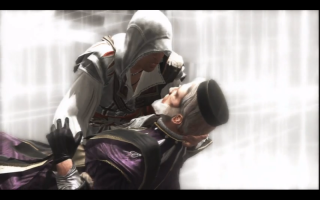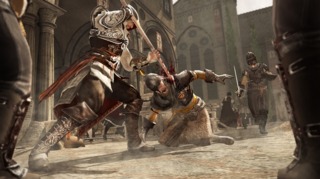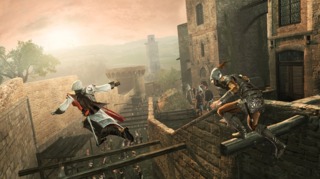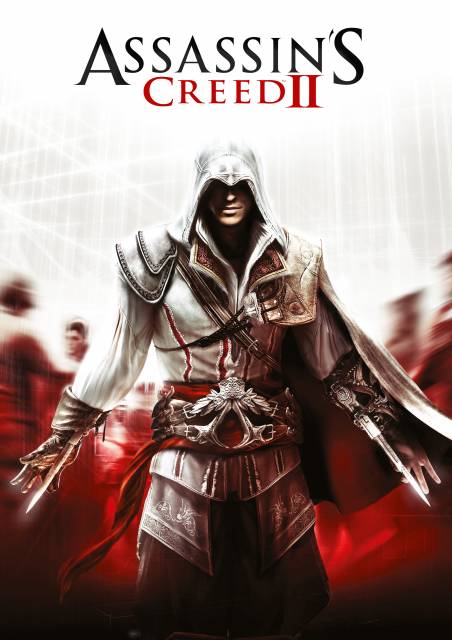Exactly what a sequel should be.
Currently, the video game industry is driven by sequels; rather than risk a lot of money on a new series, game companies would rather stick to a franchise that has previously proven itself. Unfortunately, developers do not show any signs of relenting any time soon, so if they are going to maintain an entire medium mostly through sequels, they should at least know how to do it. Assassin’s Creed II is a prime example of how to make a sequel.
The first way it proves this is by detaching itself from the previous game. Rather than rely on the previous game’s story entirely, it instead gets the original story of Desmond’s fight with the Templars out of the way to tell its own story. This time, you follow the story of Ezio, a Florentine noble turned assassin. Like the last medieval assassin Desmond shadowed, Ezio must slowly build himself up from the bottom, something that may disappoint those looking for a more direct story. However, unlike Altair of the original Assassin’s Creed, Ezio experiences greater character development; Ezio kills because of personal reasons, not because he is told. His ultimate goal is not to repel an invading force, but rather to avenge his father, whom his targets have killed. All this expansion of the protagonist’s role in the story makes for a slightly more believable story and world, something Assassin’s Creed II excels at. Things like continued development of cities, characters speaking Italian, and an affable cast of characters taken straight from the pages of any history book make it quite easy to become immersed in Renaissance Italy , even if the copious conspiracy theories and sometimes cartoony graphics somewhat mar that immersion .

Given the nature of the game, a highly detailed world is almost necessary; there are many reasons to explore Italy , and a poorly constructed world would become apparent rather quickly. Aside from a wider variety of means of travel (horse, boat, swimming, etc.), there are also many hidden objectives to be found, each with proper motivation. While some of them are new to the series, like the sometimes-overly-cryptic glyphs which expand on the story and Prince of Persia-esque tombs that unlock better armor and weapons, Assassin’s Creed II also improves on several features that its predecessor introduced. The first that comes to mind is the viewpoint system . It was a satisfying way of uncovering areas of the world in the original, and that has not changed here. What has changed is their complexity, the variety of moves with which to climb the towers, and what they reveal now.
Specifically, they reveal that there are fewer cities than there were before. One of the few areas where the original Assassin’s Creed surpasses its sequel is level variety; while the original game had you constantly traveling between a variety of cities all throughout the game, its sequel prefers restricting Ezio to one city for a long time before moving onto another one of a small collection of them. The trade-off seems to be that each city is larger, making for a larger medieval playground in which you can climb and jump. A large part of the game consists of jumping from building to building in search of targets , effectively shrinking the environments quickly.

Yet while the number of cities to explore has deteriorated, the number of things to do in them has improved immensely. The most significant addition is that of a currency system, allowing you (among other things) to buy health potions, bribe guards, change the color of your cloak, upgrade your armor, and purchase new weapons. No longer are you limited to swords and knives; Assassin’s Creed II presents you with a variety of ways to kill enemies, even if some of them aren’t very useful (pistols, poison daggers, etc.). In addition, battles now have much more strategy to them than before; enemy health is now displayed upon lock-on, and while fights can quickly decline into violent button mashing affairs,there is a myriad of moves, each with their own specific purpose and strategy. Of course, a lot of the moves and weapons don't serve as an important a role as they should, but for those who wish to use them, they work well and are often satisfying to use.
In fact, one theme that seems to run throughout Assassin's Creed II is that while some of the improvements are decent, they are not exactly necessary. The example that best illustrates this point is Ezio's country villa: in theory, it should be a completely customizable mini-city, since you can buy town repairs, build new areas, and fill the nearby mansion with priceless paintings and armaments you no longer use. The motivation is sufficient, as upgrades will give you discounts on high level items sold only in that town, and repairs increase the value of the villa, translating into more money regularly flowing into your pockets. However, the problem that causes the entire concept to crumble is that it just isn't that fun; your small town feels less like a customizable area of the game and more like a checklist you may or may not complete throughout the game.
The only reason to bother with the feature at all is, as mentioned before, the regular flow of money it generates. In addition to purchasing the best weapons and armor, you will constantly need money to refill your vulnerary and weapon supplies, both of which drain somewhat quickly as you naturally progress through your missions. On the subject of missions, they comprise some of the most notable and distinct changes in the entire game. A common complaint directed toward the original Assassin's Creed was that the missions were repetitive and followed too similar structures, and it is very pleasing to see that Ubisoft has made it their goal to mend these flaws in Assassin's Creed II.
For instance, you are never permanently aimed at your assassination; the mission structure of this game is more laid back than that of its predecessor, allowing you to branch off into side missions and explore the city at your leisure. During this time, you can take up any number of side missions, ranging from races and chasing thieves to stealing valuable objects and exploring grand tombs. The reward for each one varies greatly, ranging from a simple cash reward to chances to unlock the best armor in the game, although a lot of them do not have any reward whatsoever. Again, there is a trade-off: unlike the original Assassin's Creed, these missions are not necessary to build up to the actual assassinations. However, this, when combined with the meager reward they offer, makes you wonder why they even bothered adding these side missions in the first place.

After all, the actual assassinations have improved immensely. They build up over a series of smaller missions, tackling things such as finding a way to get to your target or fighting off a small army the enemy has sent to deal with you. Obviously, this means that they're more complex and varied, as are the actual assassinations. Killing a target no longer requires that you follow a group of scholars to your target and then unsubtly stab your foe. Sneaking through the streets of Florence is very refined and presents you with many options; you can distract guards with a dead body, freely follow a group to your target, or hire a group of mercenaries or thieves to distract nearby guards (each in their own specific way).
This freedom does not end when you meet with your target, as there are many ways to take out your target. You can overtly challenge them to armed combat, but other options include spotting them in a crowd and sneakily stabbing them, or even assassinate them from a distance with your throwing knives. More often than not, the easily provoked guards will catch onto these plans before they can be implemented, leading to a conspicuous fight, but the fact that these options are present is enough of an improvement. Besides, it is always possible to dart from rooftop to rooftop in order to escape your pursuers.
However, the game is not without its flaws, the most notable of which is that it's slightly more bug prone than its predecessor. Things like odd vehicle physics, AI anomalies, and graphical flaws can hurt not only the way the game works, but also the immersion so much of it has established thus far. In addition, the overall quality starts to deteriorate near the end of Assassin's Creed II, as it forces you to do things like complete a collection and use skills that were never used before to see a somewhat illogical ending. Overall, though, Assassin's Creed II is an excellent game that fixes a lot of the flaws of its predecessor, making the core gameplay much more enjoyable because of it.
